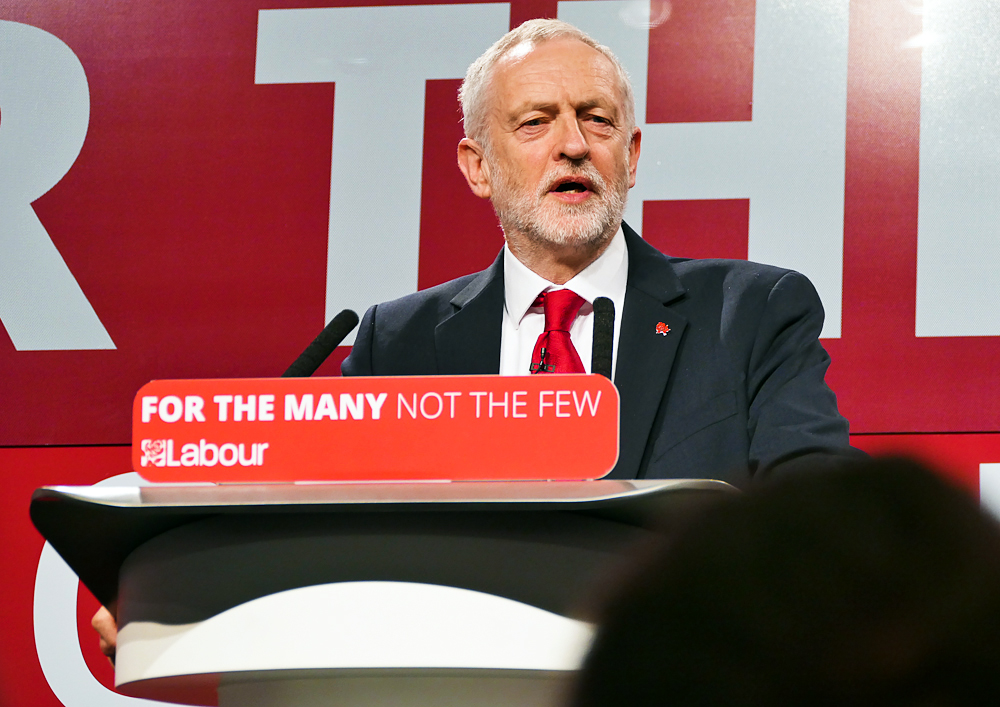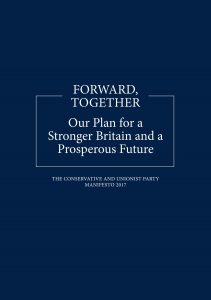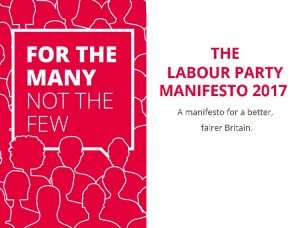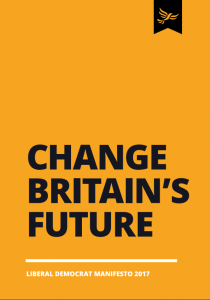
gal-dem’s hot take on general election party manifestos
Leah Cowan, Jasmin Yusuf, Kimberly McIntosh and Angel Ie
26 May 2017
Until zero-hour contracts are scrapped, and the function that auto-plays the next episode on Netflix is abolished, nobody has time to read a bunch of 100-page PDFs. Fear not: four gal-dem contributors have stepped up to give us the skinny on the Labour, Conservative, Lib Dem and Green Party #GE2017 manifestos.
Kimberly McIntosh on the Labour party manifesto
With the hangover of Brexit still a lingering headache, the snap election is the round of tequila shots at 3am that no one really wanted. A six-week government shutdown preceding the inevitable two-year civil service Brexit-induced blackout is exactly what the country needed. Fighting the urge to take a three-year nap and with no access to another passport, I read the party manifestos. And Labour’s looks pretty good to me.
Dubbed “Comrade Corbyn” with the “radical plan” by the Evening Standard, what stood out as truly radical was that policies a stone’s throw from the left-of-centre are now considered revolutionary. Rent caps and bursaries for nurses are the code-red equivalent of jumping on a podium and singing The Internationale. Stuart Hall’s prophetic predictions of New Labour as a symbolic societal shift were not misplaced. The stage set and solidified from Thatcher through 1997 – we live out the consequences in this election and beyond.
In the immortal words of bassline icons H20: ‘What’s it gonna be?’ You can find the full manifesto here. Below are some standout policies. Whatever you do: if you can, vote on 8 June, 2017.
Cheaper train tickets
In a foregone conclusion that’s got me more shook than the final scene of Get Out, my Young Person’s Railcard will run out next year. I will never be able to afford a train again – forced to familiarise myself with the Megabus schedule. Unless, like the police car scene, Labour wins the election in a surprise happy ending, and in turn repeal the 1993 Railways Act. The plan to renationalise railways would also include a train fare freeze and free Wi-Fi. Sign. Me. Up. The former publicly owned East Coast line made £209 million for the Treasury in 2012, had more punctual trains, and had passenger satisfaction at an “all time high”. It was sold off in 2015 and passenger satisfaction immediately fell. Punctuality over profit please.
No more indefinite detention
Labour will scrap the costly, unsustainable, inhumane and indefinite immigration detention policy. Anyone who has attended a Movement for Justice demonstration or read the gal-dem coverage knows the human toll of detention. A report by the All Party Parliamentary Group (APPG) on Migration made MPs audibly gasp as testimonies from detainees were shared – suicide attempts and sexual assault are commonplace. An end to indefinite detention is a step in the right direction.
Rent cap and commitment to Council houses
Last week, Australian millionaire Tim Gurner gave millennials everywhere unsolicited advice: stop eating avocado on toast and save for a deposit. Whilst I wait until 2117 to consolidate my cancelled brunch savings – combined with my non-existent inheritance from the assets my family does not have – I guess I’ll be renting. And at £712 a month for my overpriced room in Zone 2 that was once social housing stock: I welcome the proposed rent cap and commitment to build 100,000 council and housing association homes per year.
More cash for the NHS
The NHS is a lifeline the country can’t afford to lose. It saved me from tuberculosis in 2008, and countless lives every day. The Channel 4 documentary Confessions of a Junior Doctor should act as a cautionary tale – the NHS is bursting at the seams. £30 billion for the NHS over the next parliament promised by Labour is a smash hit.
University tuition scrapped, maintenance grants and nurses’ bursaries back
The Royal College of Nursing reported that scrapping bursaries for nurses has led to a 20% drop in applications in 2017. And the increase of university fees to £9000 saw a 50% reduction in applications for part-time studies 2010-2015. Labour’s manifesto gets rid of university tuition fees and brings back maintenance grants for living costs and bursaries for nurses. This will democratise access to education and encourage applications for nursing at a time of high demand for their important work as our population continues to age.
 Jasmin Yusuf on the Conservative party manifesto
Jasmin Yusuf on the Conservative party manifesto
I’m immediately struck by the irony, contradictions, and phatic language within the Tory manifesto. The conservatives attempt to portray themselves as an inclusive party which will “govern in the interests of the mainstream British public” and the manifesto states that “[May’s] leadership will be driven not for the benefit of a privileged few but by the interests of ordinary, working families”. Frankly, I call bullshit. The Conservative party has a proud history of utterly failing to represent the interests of “ordinary working families”. Throughout the past seven years of Tory rule, we’ve observed and fought-back against increased tuition fees, the destruction of social housing, the ramping up of anti-immigration rhetoric, and violent austerity measures which have irreparably damaged services that offer vital support, and in some cases a life-line, to people up and down the country.
Firstly, the manifesto includes a vote to repeal the ban on fox hunting. This is clearly a white middle class interest, and just one of the reasons why it is not a manifesto “for all of us”. The contradictions continue: the manifesto brazenly states it will be “fair to younger generations”. However, parliament has recently passed the Higher Education and Research Bill, which will see tuition fees increase this September, and universities have the power to continue increasing fees. With the commercialisation of education, it’s no surprise that Corbyn is more popular among young people.
Particularly worrying is the £178 billion to be invested in new military equipment over the next decade. To cut free school meals for infants but invest billions in military equipment starkly exposes the Conservative party’s prioritisation of warheads over children. The reason for investing in military equipment is also unclear; spending more on bombs and drones is not going to stop terrorism, or Assad’s regime in Syria. If anything the stockpiling of arms seems only to escalate conflict, rather than resolve it. This proposed spending on military also flies in the face of the National Audit Office which has previously expressed concerns about whether Britain can afford to spend £178 billion.
The proposed creation of 10,000 “modern prison places” is a pledge which should sound alarm bells. People from ethnic minority backgrounds are disproportionately represented in prison population, at an even greater disproportion than in the US. The number of young Asian prisoners in the UK has risen by 75% in the past decade and black prisoners account for one in five young people in prison, despite making up only 3% of the UK’s population. In light of this, shouldn’t budget be diverted to rehabilitation, rather than more disproportionate incarcerations? Our end goal should be to have less prisons, not more. Long term trends show that crime has been falling in the last 20 years, and even the manifesto boasts that there are “historic falls in crime and improvements in public safety”, so why the need for 10,000 new prisons?
The phatic language of a “fairer” Britain and statements like “we abhor social division, injustice, unfairness and inequality”, is not fooling anyone, and especially not people of colour. The plans Theresa May wishes to put in place does not accommodate me nor people who look like me. In fact Tory policies that scapegoat and demonise our communities are antithetical to our progress; they pose more challenges that we have to overcome.
The Tories’ anti-immigration sentiments and activities has created a palpable atmosphere of fear, hostility, and scapegoating of the “other”, when in the words of Benjamin Zephaniah “I am not de problem”. May’s slogan “forward together” is untrue when many people- including those with disabilities, young people, working class people, and communities of colour – have already been left behind thanks to her party’s austerity measures.
Leah Cowan on the Lib Dem manifesto
The first time I voted for the Lib Dems I was 7 years old. It was a mock election at school, and I put my hand up for the Lib Dems partially because the boy representing them was cute, but mainly because yellow was my favourite colour. Out of a class of 35, they only got two votes. My conception of the Lib Dems continued along an even trajectory from this moment: an outsider party that sounds kinda cute, but not radical enough to bother wasting an anti-Tory vote (unless votes are only being chalked up on a blackboard).
Even if I could push party leader Tim Farron’s homophobia to the edge of my plate, the Lib Dem’s 2017 manifesto would remain an unpleasant concoction; a clumsy melange of libertarianism and right-wing rhetoric. As with many of the main party manifestos, the Lib Dems lump together immigration and asylum (despite Farron blogging about the dangers of this conflation himself), and reinvigorate the exact same tabloid-esque UKIP-ish alt-facts that led directly to the Leave victory in the EU referendum, and the spike in hate crime that followed. The Lib Dem manifesto blames “large-scale immigration” for putting a strain on public services; an assertion which is untrue, and a repulsive adoption of right-wing messaging which obfuscates the fact that cutting budgets for public services to the bone is what really undermines their ability to operate properly.
Whilst on one hand calling for a more “efficient” immigration system with swifter decisions for asylum claims, the Lib Dems also propose a second EU referendum, alongside protections of freedom of movement for EU nationals. Of course, white people love to come through on libertarian alternatives to border controls when it affects them directly. The system which previously made “swift decisions” on asylum claims- Detained Fast-Track- was in 2015 ruled unlawful. The High Court deemed that decisions on the “credibility” of experiences as nuanced as persecution on the basis of sexual orientation simply cannot be made “swiftly”. Of course, it’s disgusting that the credibility of such claims are interrogated in the manner that they are, and at all, but the Lib Dem’s position on this issue is an alarming sign of its shimmy to the centre.
The manifesto promises to plunge £300m into community policing, and to equip police with body cams to protect both the public, as well as police officers from so-called “malicious” accusations. In reality, body cams are used to inhibit police brutality (preventing the symptom rather than attacking the root), and to deter activists from attending protests and actions. Developments in technology will likely lead to equipping these cams with face recognition software in order to target, racially profile, and intimidate individuals and groups which are considered to pose a threat to government interests.
On a more positive note, the Lib Dems want to end the abuse (not existence) of zero-hour contracts, take action on corporate tax avoidance, and scrap Prevent- the UK’s anti-radicalisation project which in reality racially profiles and penalises communities of colour, and performs state-sanctioned Islamophobia. The Lib Dems also pledge to limit custodial sentences, and to end imprisonment for possession of illegal drugs for personal use. This is a welcome proposal, considering that black people are six times more likely to be stopped and searched for drugs, and are subject to immediate custody for drug possession charges at a rate of five times that of white people.
In short, the 2017 Lib Dem manifesto presents a real mixed bag; a confusing hotch-potch of incongruous policies and promises, some of which sound progressive. However, all of which are fundamentally undermined by the more reactionary content they nestle alongside.
 Angel Ie on the Green Party manifesto
Angel Ie on the Green Party manifesto
They say that whilst smaller parties can afford to gamble on big promises, the real contenders in the #GE2017 competition will have to be more pragmatic about what they say. With this in mind, the Green Party’s manifesto might at first glance present Theresa May with an all-new “fantasy wish list” to deride. Promises to phase in a four-day week, introduce a universal basic income (where individuals receive a regular unconditional sum of money from the government, in addition to their earned income) and secure a living wage for all the pledges read like a dream come true. These pledges will appeal to many across the political Left who want to create a more caring society that provides according to people’s needs rather than what they can pay for.
What immediately jumps out from the Green Party’s manifesto and the accompanying Gender Equality manifesto produced by their women’s division is the close attention to minorities within their vision for a Green Britain. Emblazoned across the Gender Equality manifesto are two brown fists in pole position, but how far are the Greens willing to address the material concerns of our communities rather than just centring our images in their campaigning material?
Desperately trying to break from the unfortunate image of “middle-class Communists” the party has been derided by the political Right. The new Green leadership under Caroline Lucas, Natalie Bennett and Jonathan Bartley has consistently made efforts to depart from the population control policies and anti-immigration stance that underscored the Green movement in Britain since its inception in the 1970s and still continues to drive a small section of the Greens membership to this day. In a refreshing and convincing turn, the Greens pledges in this election address issues of increased and invasive surveillance, access to education and airport expansion that disproportionately affect communities of colour.
Much of the tone of the manifesto aligns itself with the social democratic style of the Labour Party under Jeremy Corbyn – testament to the new progressive alliances that some within both parties are calling for. However what we expect from the Greens is a focus on the environment, and this is certainly spoken for in the manifesto. The promise of “equal access” to natural green spaces is an encouraging attempt at democratising environmental issues which are still all too often seen as being “for white people” despite the fact that pollution, climate change and environmental disaster always come for people of colour first. Although this pledge doesn’t directly address the underlying causes of the exclusion of ethnic minority groups from the politics of the environment, and racist and classist assumptions in the Green movement, it is certainly a step closer to building a cohesive and inclusive green resistance that encompasses a wide range of approaches and needs.
Overall the 2017 Green manifesto is a step in the right direction for a party that has been plagued by a narrow concentration of support mainly from the white middle-class. But if the fight is against five more years of Tory governance that is set on chipping away at the last remaining foundations of social democracy then the question that must be asked is: are the Greens and their supporters more concerned with promoting their own vision than in taking concrete action to stem the rising tide of far-right politics that will be part and parcel of a renewed Tory majority?

Britain’s policing was built on racism. Abolition is unavoidable

How Pakistan’s Khwaja Sira and transgender communities are fearing and fighting for their futures

Their anti-rape performance went viral globally. Now what?








